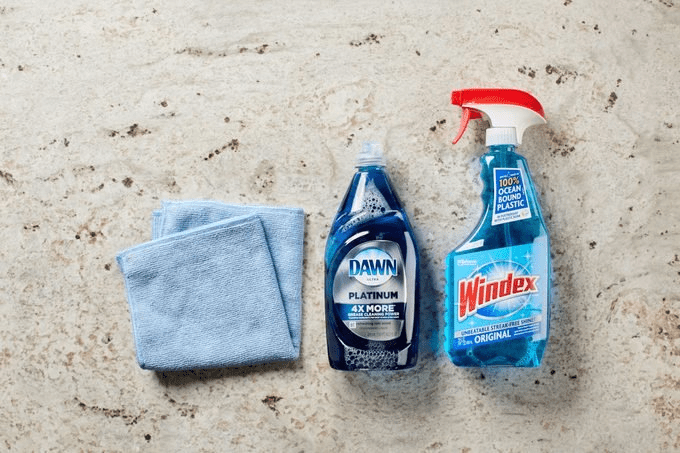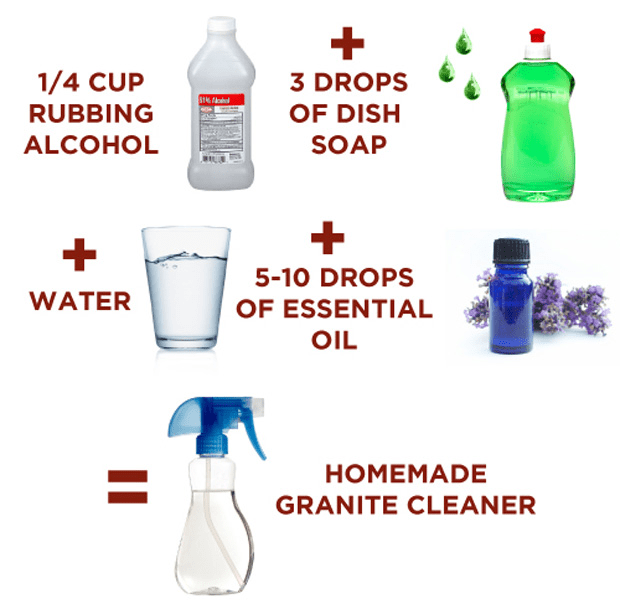Natural stone countertops such as marble and granite have long been a popular choice among homeowners due to their durable stone, appealing appearance, and widespread use. Granite is a long-lasting countertop material that may last a lifetime when properly cared for.
However, liquids such as wine, juice, acidic foods, and oil can seep through the slab and discolor the surface because granite is a porous stone. Bacteria can grow in natural stone pores in the worst-case situation. Therefore, granite countertops require sealing and proper maintenance.
Acidic substances such as dishwashing soaps and detergents can damage an unsealed granite countertop. Even though dish soap will not permanently damage your granite surface, repeated soapy water will produce build-up and reduce your countertop’s shine.
Dawn is a dishwashing liquid brand owned by Procter & Gamble in the United States. It was created in 1973 and is one of the best-selling brands of dishwashing liquid in the United States.

Can you use Dawn dishwashing soap to clean the granite countertop?
It would help if you cleaned granite with a soft cloth or clean microfiber cloth and neutral cleaners, such as mild liquid dishwashing detergent safe for granite. You can also try using stone cleaners available in the market, safe for granite.
However, Dawn Dishwashing Soap is a fantastic wetting agent with cleaning superpowers. It works wonders for grease and grimes on your dirtiest utensils.
Do you know the science behind it?
According to Family Handyman, the formulation for dawn dishwashing soap is a secret ingredient off the map for people. However, the science says the surfactant reduces the surface tension of any liquid when dissolved in liquid. Thereby making the cleaning process easier. `
Now the Big Question- Is it safe to use Dawn dishwashing soap on granite countertops?
Well, the answer is ambiguous. I mean, yes, the dish soap won’t damage your granite countertop permanently, but regular use somehow can take the shine away due to some stubborn build-ups. So, it’s not advisable to use dish soap daily. However, if your countertop is well sealed with a granite sealer, you can clean the granite surfaces with a bar of mild dish soap with proper care and guidance.
Even if soap residue accumulates on your granite counters, use a non-acidic soap scum remover like Simple Green Stone Cleaner. Scrub the stone with a moist, gentle cloth after spraying it on. Scrub using a circular motion. Clean with a damp cloth.
Remember that liquid soap leaves a residue that will show up over time, especially on darker stones.
To remove oily stains:
Form a paste with baking soda and a few drops of acetone and leave it on for 24 hours, then rinse with water and wipe it away with a microfiber cloth.
To disinfect the surface:
Spray 70% of the isopropyl on the surface and leave it for the next 3-5 minutes. Afterward, rinse the countertop with normal water and wipe the surface clean with a microfiber cloth.
Caution: Don’t use bleach, ammonia-based cleaners, vinegar, or Windex on natural stones.
Bonus Read: Granite Vs. Marble Vs. Quartz Countertops
Alternatives to cleaning your granite countertop to remove tough stains
Here are some best homemade Natural Granite Cleaners to disinfect natural stone countertops
- Isopropyl alcohol, 1/4 cup (aka rubbing alcohol or surgical spirits)
- 3-5 drops of castile soap liquid (or any dish soap)
- In a spray bottle, combine one-half cup rubbing alcohol, one-half teaspoon dish soap, and one-and-a-half cups warm water.
- a few drops of essential oil (optional)
- Baking soda paste – For better results, use a mixture of baking soda and hydrogen peroxide.
- 1/2 gallon distilled warm water (distilled is best, but filtered tap water is fine for short term storage)
- Hydrogen peroxide, In a pot, mix 1/2 cup hydrogen peroxide, 1 cup flour, and 2 to 3 tablespoons cold water.

One should make sure that you properly seal your granite countertops before using them. Well, a sealed granite countertop prevents it from further damage, stain, or scratch. Sealing your granite countertops is a precaution that many fabricators and experts advise.
What should you avoid using on your granite countertop?
There are certain chemicals and products that you should avoid for cleaning granite countertops. Some of which are mentioned below.
Acidic substances
Vinegar, citrus fruits, fizzy beverages, lotion, nail polish, and perfuse can all erode at the surface of your granite and cause it to seal. These things may leave a permanent stain on your surface. Use chopping boards and coasters, and immediately mop up any spillage.
Clorox wipes
Whether in the form of Clorox wipes on granite or Multi-Purpose cleaning fluid to clean or disinfect granite. The wipes are also a cleaning you should avoid because they contain citric acid, which can wear down your sealant.
Windex
Windex has chemicals that can harm granite in the long run. While Windex is most commonly used to dull the brightness of countertops, it can also induce pitting. Windex will remove the sealer from your granite countertops, exposing them to stains and other damage.
Lysol
Experts do not recommend the use of Lysol on granite countertops, backsplashes, or vanity tops. The cleanser contains harsh elements that can reduce the efficiency of your sealer. Ammonia is also present in the product. Ammonia-based cleaners are particularly hazardous to granite.
![Granite Vs. Marble Vs. Quartz Countertops [12 Differences+Pros & Cons] Granite Vs. Marble Vs. Quartz Countertops [12 Differences+Pros & Cons]](https://houseadorable.com/wp-content/uploads/2022/03/quartz-marble.jpg)
![Centerset Vs. Widespread Faucets [8 Differences Explained] Centerset Vs. Widespread Faucets [8 Differences Explained]](https://houseadorable.com/wp-content/uploads/2023/03/1_332369605_6500081363358836_8480186754416832788_n-250x250.jpg)
![Granite vs. Laminate Countertop [Pros and Cons+10 Key Differences] Granite vs. Laminate Countertop [Pros and Cons+10 Key Differences]](https://houseadorable.com/wp-content/uploads/2022/03/Granite-vs.-Laminate.jpg)
![Granite vs. Quartz Countertops [Pros & Cons+6 Key Differences] Granite vs. Quartz Countertops [Pros & Cons+6 Key Differences]](https://houseadorable.com/wp-content/uploads/2022/01/Copy-of-HouseAdorable.com-1.jpg)
![How to Clean Kitchen Cabinets Without Removing Finish[8 Methods] How to Clean Kitchen Cabinets Without Removing Finish[8 Methods]](https://houseadorable.com/wp-content/uploads/2022/06/care-for-kitchen-cabinet.jpg)
![How To Care For Quartzite Countertops? [Cleaning+Sealing Explained] How To Care For Quartzite Countertops? [Cleaning+Sealing Explained]](https://houseadorable.com/wp-content/uploads/2022/05/q.jpg)
![What Are Kitchen Sinks Made Of ? [13 Types+Pros & Cons] What Are Kitchen Sinks Made Of ? [13 Types+Pros & Cons]](https://houseadorable.com/wp-content/uploads/2022/01/Sink-MAterial.jpg)
